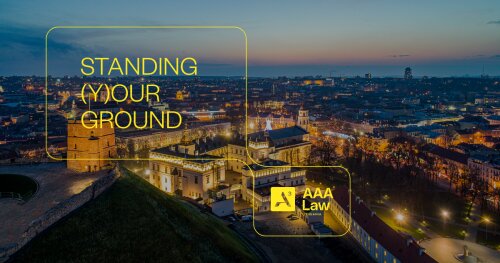Best Art & Cultural Property Law Lawyers in Vilnius
Share your needs with us, get contacted by law firms.
Free. Takes 2 min.
List of the best lawyers in Vilnius, Republic of Lithuania
About Art & Cultural Property Law in Vilnius, Republic of Lithuania
Art & Cultural Property Law in Vilnius, Republic of Lithuania, governs the protection, management, and ownership of artworks and cultural heritage items. This field of law is closely linked to preserving Lithuania's rich cultural history and ensuring that cultural assets are managed appropriately within national and international frameworks. In Vilnius, a city with vibrant cultural heritage, this law covers aspects ranging from the protection of cultural treasures and historic monuments to addressing issues of art market regulation and restitution of cultural property.
Why You May Need a Lawyer
There are several situations where individuals or organizations may require legal assistance in the field of Art & Cultural Property Law:
- Buying or selling artworks where provenance needs verification.
- Handling inheritance disputes involving artworks or artifacts.
- Restoring stolen or illegally exported cultural property.
- Entering agreements for the exhibition or loan of pieces with international entities.
- Addressing legal concerns about cultural heritage protection regulations.
- Understanding and applying for necessary permits for archaeological excavations.
Local Laws Overview
In Vilnius, Art & Cultural Property Law encompasses a range of legislation aimed at preserving Lithuania's cultural heritage. Key aspects include:
- The Protection of Movable Cultural Property: Legislation protects objects of historical or cultural value, requiring specific permits for their export or restoration.
- Cultural Heritage Protection Law: This law outlines the responsibilities of governmental bodies and private individuals in maintaining and safeguarding cultural heritage sites.
- International Conventions: Lithuania is a signatory to several international agreements such as the 1970 UNESCO Convention, which regulates the import and export of cultural property.
- Art Market Regulations: These include laws governing the licensing of dealers and auction houses, along with specific measures to prevent the circulation of forgeries and stolen artworks.
Frequently Asked Questions
What is considered cultural property in Vilnius, Lithuania?
Cultural property includes artworks, antiques, historical artifacts, archives, and other items considered of significant cultural value or national heritage within Lithuania.
Can I export a piece of art from Lithuania?
Exporting art from Lithuania typically requires a permit, particularly for items considered cultural property. These laws aim to protect and preserve the nation's cultural heritage.
What are the consequences of illegally exporting cultural property?
Engaging in the illegal export of cultural property can result in penalties, including fines and the seizure of the item. Severe breaches may involve criminal charges.
How do I prove ownership of cultural property?
Ownership can be established through documentation such as purchase receipts, provenance records, inheritance documents, and certificates of authenticity.
Are there legal protections for artists in Vilnius?
Yes, intellectual property laws, including copyright, protect the rights of artists in Vilnius, ensuring they benefit from their creations and can prevent unauthorized use of their work.
What steps should I take if I suspect a piece is stolen?
If you suspect a piece of art is stolen, it's important to contact law enforcement and a legal professional to investigate and address the issue through appropriate legal channels.
How can I check the authenticity of an artwork?
An artwork's authenticity can be verified through expert appraisal, provenance research, and forensic testing. Legal advice can guide you on undertaking these processes.
What role does UNESCO play in Lithuania's cultural property laws?
UNESCO conventions provide a framework for protecting cultural property on an international level, influencing national laws like those in Lithuania that prevent the illegal trade of cultural artifacts.
How can art and cultural property laws affect exhibitions?
Exhibitions must comply with regulations regarding the loan of cultural items, including ensuring proper permits and conformity with international agreements for temporary import/export.
What if I inherit art or cultural property?
Inheritance laws will guide the proper transfer of ownership, and legal advice can help navigate any disputes or formalities concerning the cultural items involved.
Additional Resources
Here are some resources related to Art & Cultural Property Law in Vilnius that could be helpful:
- Lithuanian Department of Cultural Heritage: Provides information on heritage protection laws and permits.
- Lithuanian Ministry of Culture: Offers insights into cultural policies and international conventions.
- UNESCO Lithuania National Commission: Engages in implementing international cultural heritage conventions.
- Lithuanian Lawyers' Association: Can assist in finding a legal practitioner specializing in art law.
Next Steps
If you find yourself needing legal advice in Art & Cultural Property Law, consider the following steps:
- Consult with a lawyer specializing in cultural property law to understand your rights and obligations.
- Gather all relevant documentation related to the artwork or cultural property in question.
- Contact relevant authorities or organizations for guidance, especially if it involves cross-border issues or national heritage interests.
- Consider engaging with local cultural institutions for expertise or potential collaboration opportunities.
Lawzana helps you find the best lawyers and law firms in Vilnius through a curated and pre-screened list of qualified legal professionals. Our platform offers rankings and detailed profiles of attorneys and law firms, allowing you to compare based on practice areas, including Art & Cultural Property Law, experience, and client feedback.
Each profile includes a description of the firm's areas of practice, client reviews, team members and partners, year of establishment, spoken languages, office locations, contact information, social media presence, and any published articles or resources. Most firms on our platform speak English and are experienced in both local and international legal matters.
Get a quote from top-rated law firms in Vilnius, Republic of Lithuania — quickly, securely, and without unnecessary hassle.
Disclaimer:
The information provided on this page is for general informational purposes only and does not constitute legal advice. While we strive to ensure the accuracy and relevance of the content, legal information may change over time, and interpretations of the law can vary. You should always consult with a qualified legal professional for advice specific to your situation.
We disclaim all liability for actions taken or not taken based on the content of this page. If you believe any information is incorrect or outdated, please contact us, and we will review and update it where appropriate.















